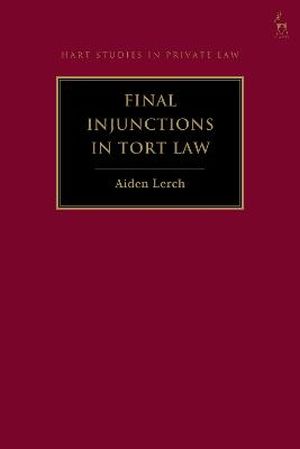
This book is the first considered study of final injunctions in tort law. It devises a novel taxonomy of such injunctions and explores the implications of the law on injunctions for the way in which scholars think about tort law more generally.
The book begins by analysing how the injunction in aid of legal rights came to be developed as a remedy in the Court of Chancery. It then provides definitive guidance as to the range of final injunctions that may be available to restrain or remedy torts. A clear, structured framework to guide legal reasoning in injunction cases is constructed. The book concludes by making several claims about tort law in the light of the availability of injunctive relief.
In addition to the taxonomy that is developed, the overarching message of the book is that injunctive relief is a central component of the law of tort. The way in which tort law is expounded in textbooks and monographs, and taught in universities, needs revising. Specifically, we must not overemphasise the award of damages and neglect to highlight the importance of the injunction. The true position is that injunctive relief is as crucial as damages are to enforcing the rights that are generated by tort law.
Reviews
"This book contains a fascinating and original analysis of the content and role of injunctions in tort law. Its central thesis is that we have traditionally placed too much weight on damages as a remedy in tort and not enough on injunctions. The punchy and logical style renders the author's thought-provoking arguments clear and accessible. All those interested in tort law, whether students, academics, judges or practitioners, will benefit greatly from reading this excellent work of practical legal scholarship"
Lord Burrows, Justice of the Supreme Court of the United Kingdom and a Fellow of All Souls College, Oxford
"This book fills a long-neglected gap in what is otherwise a very crowded body of tort law scholarship. It is the first comprehensive account of the way that the rights protected by tort law can be secured by final injunctions. Injunctions, Lerch reminds us, are far more commonplace in tort that is widely recognised. And - via his carefully constructed taxonomy, together with a highly detailed exposition of the circumstances under which final injunctions may be granted - Lerch has produced a book about injunctions in tort law that deserves, beyond question, to be regarded as setting the gold standard."
John Murphy, Hong Kong University
"This is a marvellous book that should be the first port of call for any lawyer interested in this all too neglected area of law. Virtually every page contains a wealth of information and insight that repays repeated study and reading. It is a remarkable achievement and a landmark in our understanding of this area of law."
Nick McBride, University of Cambridge
"This important book makes a compelling case for recognising the role of injunctions across tort law generally. Given recent judicial willingness to extend the circumstances in which injunctions can be granted, the book is very timely in providing not only a taxonomy of injunctions but also a careful assessment of when each type of injunction may be granted. The book also set out, with exemplary clarity, the implications of its arguments for private law as a whole. Its analysis is therefore important for any practitioner, judge or academic involved not only with tort law, but also with equity or property law."
Ben McFarlane, University of Oxford
"This book is an outstanding and unique contribution to scholarship in the fields of torts and injunctions. It contains a closely reasoned discussion, rooted in a careful analysis of the principle and the decided cases. The author is unafraid to challenge previous statements of high authority and to advance controversial propositions, where justified by that analysis. The chapters on mandatory and quia timet injunctions are of particular note, including the development of a compelling distinction between 'desisting' and 'restorative' mandatory injunctions. The book will be of use to judges, practitioners and academics."
Perry Herzfeld, Eleven Wentworth
About the author:
Aiden Lerch is a solicitor at Arnold Bloch Leibler in Sydney. He previously held the positions of Associate to the Honourable Justice Jacqueline Gleeson at the High Court of Australia, and Lecturer in Law at Worcester College and Christ Church, Oxford. Aiden holds an LLB (Hons I, University Medal) from the University of Wollongong. He completed his postgraduate studies at the University of Oxford as a Clarendon Scholar and William Asbrey Scholar at St Edmund Hall, reading for the Bachelor of Civil Law (Distinction) and DPhil. Aiden was awarded the Subedi Prize for submitting the best doctoral thesis in law at the University of Oxford.